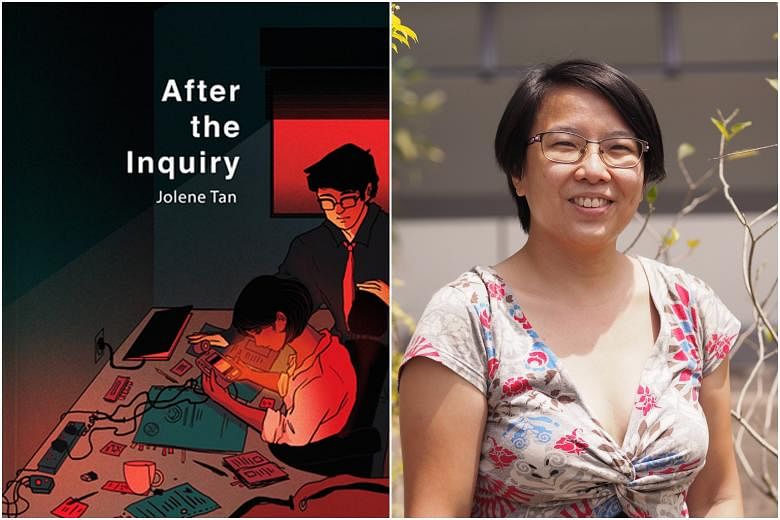Fiction
AFTER THE INQUIRY
By Jolene Tan
Ethos Books/ Paperback/ 220 pages/ $19 before GST/ Pre-order at ethosbooks.com.sg
4 out of 5
"Once we see, we cannot, must not, unsee," wrote sociologist Teo You Yenn in her 2018 essay collection This Is What Inequality Looks Like.
Most mystery novels are structured around the act of seeing - an investigation uncovers what has been hidden from sight - but Jolene Tan's chilling After The Inquiry is also concerned with the act of unseeing.
Her 2014 debut A Certain Exposure (available here) was an emotional, wrenching tale of a government scholar's suicide and the impact of microaggressions on a life.
After The Inquiry, which quotes Teo as an epigraph, is a vastly different novel.
It takes the form of a government report, complete with copious footnotes, and achieves a persuasive veneer of rationalised detachment.
At the heart of the mystery is an unauthorised firearm discharge that has left a police sergeant, Hafiz, in a coma. An Internal Affairs investigation has concluded it was a game of Russian roulette gone awry, instigated by Hafiz to haze a junior officer.
But the ministry sends in Boon Teck, a civil servant of more than 20 years, to cover all the bases. Teck and his young subordinate Nithya re-examine the facts of the case - and, in so doing, discover its cracks.
The novel, at first glance, is not immensely readable - it is ostensibly a report - but its intricacy lies in the considerable layers hidden beneath its inscrutable surface.
In Teck, Tan has created a fascinating narrator, a terrifyingly competent and cynical agent of bureaucracy, for whom every exchange is a calculated move in the unending chess match of the service.
One takes a dark pleasure in his disparaging of what he views as lesser minds. He snipes at colleagues who get "lost in the wild lalang of extraneous matters" and excoriates a forum letter writer for "a Pantone swatch book of cliches", "the usual platter of verbal yusheng". His own penchant for purple prose goes unnoted.
He is perplexed by earnest, keen Nithya, who joined the civil service out of a sincere desire to serve, although he comes to recognise that the empathy she possesses is a valuable tool he needs her to wield.
"They always came round," he thinks of the service's young idealists, "once they saw the springs and levers that tied the service's successes to the nation's, and to their own; and especially once they had a taste of the public unreason they romanticised in their youth."
One is reminded of what Kazuo Ishiguro said of his unreliable narrator Stevens in The Remains Of The Day (1989): "The butler doesn't look like a conventional monster, but I always thought that he was a kind of monster."
If Teck is a monster, he is a compellingly sensible one. That Tan has sketched him so relatably is perhaps why the novel is so unsettling.
Expect no neat denouement to this mystery. What it sets out about the hidden costs of sociopolitical systems, however, is hard to unsee.
If you like this, read: The Inlet by Claire Tham (Ethos Books, 2013, $23 before GST). When the naked body of a karaoke lounge hostess from China is found in the private pool of one of Singapore's wealthiest property developers, the investigation unearths society-wide fault lines of class and xenophobia.


